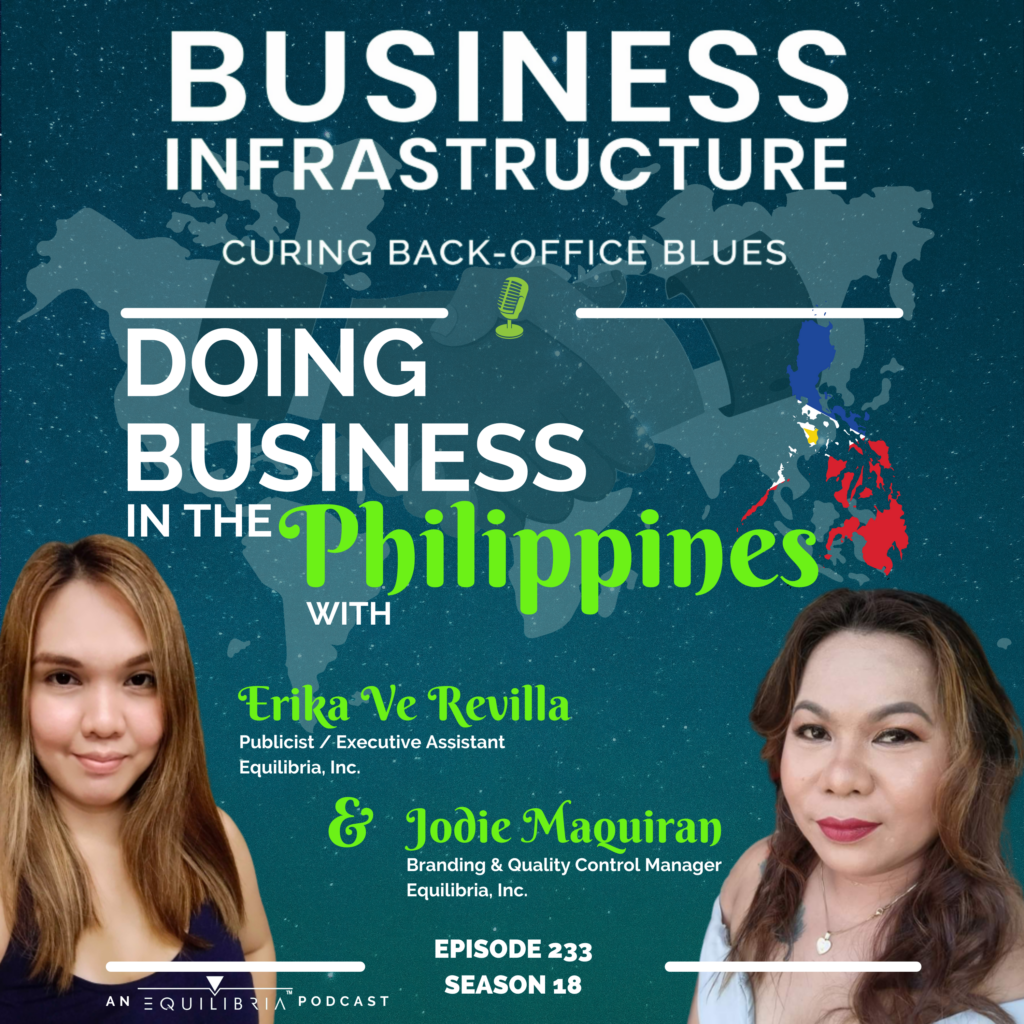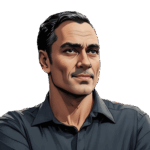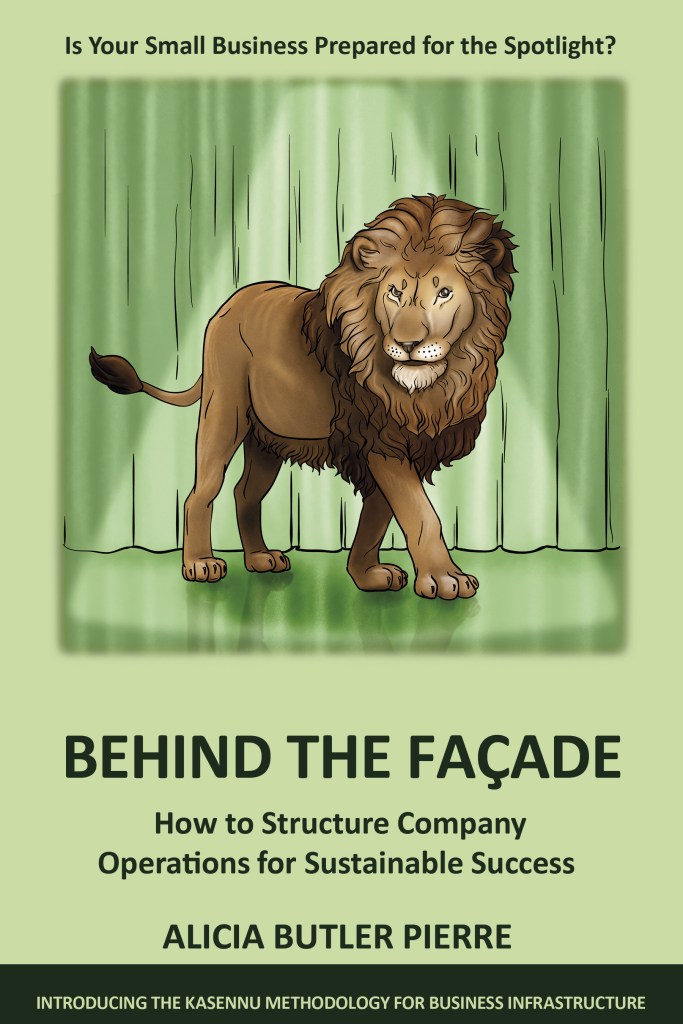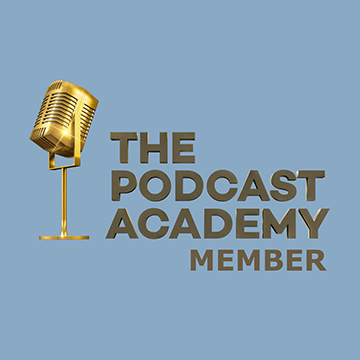Transcript
We’ve left Saudi Arabia headed to the last country on our 12-country tour this season. And I guess you can say, in many respects, we’ve saved the best for last. Not that the other countries weren’t amazing, but this one is particularly special because its where a good bit of this show’s back-office operations takes place. A place I’ve heard my dad and uncle each fondly reminisce about as they tell stories of being stationed here in the 70s while in the U.S. Military. I’m talking about…the Philippines.

This episode is underwritten by Equilibria, Inc. the company behind this podcast where we design scale-ready business infrastructure for fast-growing small businesses.
I’m Alicia Butler Pierre and this is Season 18 of the Business Infrastructure podcast – the show where we share operational tips, tactics, and tools for curing back-office blues. You’re about to hear a live recording of an interview with two key team members here at Equilibria. Luckily, the weather has held up and we’re outside near the pool. You might hear some dogs barking in the distance, but rest assured, this interview is packed with practical information about how we seamlessly work together as a team across three different countries.
This is Episode 233 – Doing Business in the Philippines with Erika Ortega Revilla and Jodie Maquiran
Mabuhay! Everyone, I learned that that means “Welcome,” I think maybe, sort of, in the Philippines. But at any rate, welcome to the Business Infrastructure podcast! We are recording live. We’re outside of the beautiful Marco Polo Plaza Hotel in Cebu City, Cebu in the Philippines. I’m your host, Alicia Butler Pierre. And joining me is Erika Ortega Revilla and Jodie Maquiran. And they are, begrudgingly joining me. They’re so used to being behind the scenes. These, these wonderful ladies are an integral part of the team here at Equilibria. And for those of you who are new listeners to this podcast, Equilibria is the company that actually underwrites this show. And you are going to hear the voices behind a lot of the work that goes on with this podcast. So, without any further ado, before we get more into what Erika and Jodie actually do, not only at Equilibria, but for the podcast specifically and what it’s like to do business in the Philippines, let’s first meet these wonderful ladies.
Erika
Hi. So, I was born and raised by my grandparents in Bohol. It’s a province here in the Philippines, known for coral reefs and unusual geological formations and notably the chocolate hills. I moved here in Cebu a year after I gave birth to my eldest child to look for a job to support her needs and to live independently. My mom is originally from Bohol and my dad is originally here from Cebu. But, after my mom gave birth, she was assigned here in Cebu. So that’s why I was raised by my grandparents in Bohol.
Erika, by the way, is a publicist and my executive assistant, and she is absolutely phenomenal at both. But I know you didn’t go to school for that, but can you tell us, Erika, what is your background in, I know you studied nursing, right, at one time?
Erika
Yeah. So, before I started Equilibria, I was a part-time online English teacher to Chinese students. But, you know, I didn’t study education because I took up nursing when I was still in college. But, if you were a parent, you’ll have to consider a lot of things. That’s when the time that I decided to look for a job that doesn’t require me to go to the office physically and leave my kids at home because, you know, here in the Philippines, it’s very difficult to look for a babysitter. And, you know, imagine I have four kids she will be taking care of. So, I truly understand. I’ve also experienced with my previous job that I brought my youngest child at work, and the other three was at home. I even asked a favor from a neighbor to look after my kids while I was still working. So, I’m grateful that our branch manager during that time was very considerate. If you don’t, that’s when the time that I realized that, you know, why not work in a remote setup and have more time with my family. So, I won’t bother other people to look after my kids. So that was my, the reason behind everything.
All right. And we’re gonna get into how we actually met, but before we do, let’s, first meet Ms. Jodie.
Jodie
I’m Jodie Maquiran, and I originally was from Bacolod City, also known as the City of Smile. And we are from the province of Negros Occidental in Western Visayas. So, my parents actually came from different islands. So, my father was from Negros Occidental also, which is in the northern part. And that would be in the Municipality of Manapla. And my mother’s family was from Panay Island. It was, I’m not sure if it’s a southern or northern part of Panay Island, but she was from Municipality of Guimbal. I’m not familiar with those places because I grew up in Bacolod City. And then currently we’re living in the south of Negros Occidental, and that’s in Kabankalan City.
Okay. And we know we have some barking dogs here in the background. We are sitting outside, so just bear with us. We are recording this live. But Jodie, I know your background is actually in social work, so can you tell us a little bit more about how you came into, that line of work and what ultimately led you to Equilibria?
Jodie
I’m actually a Registered Social Worker, in other places, they call it Licensed Social Worker. And, I haven’t practiced social work for that long since I took up the board exam seven years after I graduated in 2010. So, when I took it up in 2017, I was working in a BPO industry or a call center. So, I was there for seven years. And then right after I passed the board exam, I decided to leave the BPO industry and started working as a social worker.
I was with an NGO for six months, a residential NGO, and then I transferred to another NGO, which was under the umbrella of a sales, direct-selling company actually. I was with the direct-selling company, but after around eight months, of being there, they requested me to be part of their sales team because they said that they can see my potential being in sales. So, I’ve been with that direct-selling company under the sales team until I knew you.
That’s right. Before we get into sharing with everyone how the three of us actually met, I do want to know, if one of you wouldn’t mind explaining the Philippine Islands, they’re several islands, and what’s so interesting is this is something that I’ve learned from both of you. Maps can be incredibly deceptive because I remember when we first started planning my trip to, to come here, in my mind I’m looking at a map and I’m thinking, oh, if I fly into Manila, and then I go from Manila to Cebu, and then I can go from Cebu to some other place. In, in my mind I’m looking at this map and I’m thinking, “Oh, these are just some quick, maybe short, easy, boat trips or something like that.” And, and you all might tell me, well, no, Alicia, that’s actually going to be an eight-hour boat ride. And then to go from this island to that island might be a whole day.
It’s also worth noting that the Philippines is the sixth most populated country in the world.
Erika
Here in the Philippines, we have three main islands, or the country can be divided into three main areas. Luzon the largest north, north most island, which includes Manila, where you first landed here in the Philippines. A group of islands called the Visayas. It’s where Cebu is located, and also Jodie, is located as well. And Mindanao, now the second largest island here in the Philippines.
And how many islands are there exactly?
Erika
Philippines, we have, 7,641 islands.
Whoa!
Erika
So, you won’t find many more naturally diverse countries than the Philippines.
Wow!
Erika
We have different languages as well.
Yeah. So, let’s talk about the languages, because I, I mean, obviously you all, you know, you’re multilingual, how many languages do you speak, Erika?
Erika
Where I’m located, we usually speak Bisaya, we call it Bisaya, but our national language is Tagalog or Filipino rather.
And you clearly, speak English, right? And Jodie, how about you? How many languages do you speak and what are those languages?
Jodie
I can speak Filipino or Tagalog. I can also speak Erika’s language, which Bisaya and I can speak our own dialect, which is called Hiligaynon and English. I can understand the dialect in Panay, but I am not fluent in speaking those.
Hmm. Now let’s get into how we actually met. Again, when it comes to the podcast, let me just say or share really quickly with those who are listening, what you all are doing behind the scenes. So, Jodie is the mastermind of all of the beautiful graphics that you see, whether it’s on YouTube, the actual podcast itself, podcast pages that we have on the website, promotional materials. And she’s also the person who is responsible for getting the transcripts up there on the website as well.
And Erika, again, strictly from a podcasting perspective, is in charge of the show notes, and she’s also keeping a masterlist of all of the resources that each guest has shared on this podcast. And that is a massive list, let me tell you. But Erika, Jodie, I was wondering if we could also talk a little bit more about how we actually met, because I am asked this question all the time.
First of all, a lot of people didn’t even realize that we weren’t all in the same country until they saw pictures of the three of us together, actually here in the Philippines. So, I thought that was so funny. But it also speaks to the power of the different digital technologies that we’re using. And we’re definitely going to, to share some of those technologies with the audience.
Erika
Right. So, when pandemic started, and most of the people are looking for remote jobs, and I’m one of them because during that time, my husband…
So, Grant is Erika’s husband, everybody. So, Grant was working abroad, and you need to work, right? But you, wanna work remotely.
Erika
Yeah. That’s when I first landed my work from home career ending under a staffing agency. So, it’s where I met Alicia, when I was introduced to Alicia, the client service director discussed my task. And while listening, I was like, “Oh my goodness, I hope it’s not for me!” because I’m honestly not familiar with the mentioned task. So, you know, when Alicia and I had a meeting, I had to be very honest with her that, you know, Alicia, I didn’t have any knowledge of what a podcast is. Mm-hmm, but, you know, God is just, there’s always a brighter side. God is always good, even though they got the wrong person. I am just so blessed with a client, with a boss like Alicia. She was very patient during my learning days. That’s when the time that also I did, something for myself. I did research, what is a podcast and, you know, I started listening to podcast episodes. So, that’s what also I love here in Equilibria, is that we are always learning new things.
Absolutely. And, and I wanna just share this with everyone who’s listening. l I love telling this part of the story whenever I think about Erika, because as, as you’ve just mentioned, Erika was like, “I don’t know what a podcast is really.” So, Erika also functions as my publicist. Erika has booked me on. Well over 100 different, media outlets. So, radio, podcast, we’ve done some, interviews with on magazines, newspapers, and so it’s just always funny, but it’s also a testament to processes.
And so, what Erika and I will usually do is we’ll get together by Zoom, we will have a discussion about what is a podcast, and then what does the podcast process look like, and how to actually book me onto a show, onto a radio show, a podcast show, a TV show, how to get me featured in a magazine or a newspaper. And we just started documenting all of those processes as I’m teaching or training, Erika’s documenting things, and then we make sure it gets into another tool that we use called Notion. And so, Erika starts working at Equilibria, and then I think it was maybe two months later, Miss Jodie comes onto the scene. So, Jodie, how did you land at that particular staffing agency?
Okay. Jodie has temporarily left the building everyone, well, I’ll say this, Jodie also was introduced to me through this same staffing agency. And the idea was for her to kind of function as a branding coordinator. And the story I always love to tell about Jodie is that very similar to how Erika was like, I don’t think I can do this. I’ve never done this before. Well, Jodie was not familiar with creating graphics, and we started looking at Canva. So Canva is one of the tools that we use. We also use Piktochart, and she just, I mean, she is a wiz at it now. She is absolutely phenomenal at creating all of the graphics, and she’s so good and she’s so quick with it. So, it’s just funny. How both Erika and Jodie were like, “Oh, we don’t know how to do this…
“We we’re not good at it.” And I was like, well, you know what? Try, there will be mistakes along the way. But that’s part of the learning process, suffice it to say, eventually both Erika and Jodie reached out to me individually and asked, “Hey, can we just work for Equilibria directly?” And I said, absolutely. Thankfully, we were not under a non-compete agreement with that original staffing agency. And so here we are together in Cebu, Philippines, and we are one big happy family.
There’s, many other people that, that help us behind the scenes at Equilibria and with this show, but we wanted to talk very specifically since we’re here in the Philippines. I wanted to know, Erika, can you talk about the communication tools that we use?
Erika
Right. So, for communication tool, we use Slack, because, for Slack for example, there’s a specific task that we will be doing for a specific channel. You can add, the person who are involved with that specific task, and there’s also a direct message to it. Also, we use WhatsApp, mm-hmm, as another mode of communication.
We use WhatsApp or we tend to use it as a backup. So, for whatever reason, if we’re having trouble with Slack, or if there are some internet issues, we usually find that we can at least still communicate through WhatsApp. So those two things have been a blessing. Something else that I want to share, Erika and Jodie, with everyone listening, they may be wondering, well, how, how does the currency conversion work? How, how are you paying, you know, your employees, Alicia, and we use two methods. There’s Payoneer and then there’s Western Union. So, Erika, do you wanna share how you send an invoice and what that process looks like?
Erika
Mm-hmm, right. So, I usually create an invoice using Zoho invoice. It’s after you create the invoice, you have the option to what email address should I will be sending, after which, I will be sending a request through payoneer. And through, in Payoneer we have the option as well to attach an invoice to it. So, from Payoneer, since Alicia would be sending us through US dollars. So, we have an option here in the Philippines. Either we use an e-wallet called Gcash or through our bank directly. So, it will be converted into Philippine money or to peso.
Payoneer, is a FinTech platform, great platform that, that is designed to handle international payments and handling of invoices. Oh, yes, Jodie’s back! Okay. So, one thing we noticed at, at, at a certain point with Payoneer, we weren’t able to, for whatever reason, continue processing payments for Jodie. And so, we were temporarily using Western Union. You wanna talk about that a little bit, Jodie?
Jodie
Yeah, actually, it was around May that we had an error, six to eight months, right after we used Payoneer that I had an error receiving money for the reason that I need to attach a work agreement stating that the money I’m receiving from an international remittance is actually not fraud money. Mm-hmm. I think it’s because, it has been consistent that I am receiving in a dollar account every two weeks for a large amount. And the address that I have on that account is in the Philippines. So that means it’s either I’m employed internationally, or I have a business wherein my clients are sending payments through Payoneer account.
For those who are listening, you may be wondering, how do you pay people that you’re working with? So, we, we don’t actually work through a payroll company because it is prohibitively expensive. And so, as Erika described, she and Jodie actually just email their invoices, or they attached them through Payoneer. But we did notice, for whatever reason, at, at a certain point, Erika was able to continue sending her invoices through Payoneer and requesting payment, but for, for whatever reason, Jodie was not. And then we finally got that figured out.
Jodie and Erika, they’re such beautiful women, and they had these special Equilibria t-shirts made for everyone on the team, which was such a lovely surprise. And we had such a great time getting our measurements taken. And I remember wanting to pay you back, Jodie, and I was trying to do that through Western Union, but there was a firewall. I think you figured out, Jodie, that because I’m in the Philippines trying to pay you in the Philippines, Western Union just kind of blocked the entire transaction. So, I had to end up getting cash to pay you, in Filipino peso.
So, for those of you who are listening right now, just know that Payoneer is probably the way to go. The transaction fee is more expensive than Western Union. But when you are using Western Union and you are accustomed to paying people in other countries, the minute you actually go to that country and you’re still trying to conduct that transaction, Western Union will block it. That’s what happened to me. So be warned, you might wanna have an account with both companies, both Payoneer as well as Western Union, because I was still able to make payments through Payoneer without any problem.
Before we wrap up, I do wanna mention one other thing. So, in terms of myths and misconceptions that people might have about conducting business in the Philippines, I would be remiss if we did not bring up weather and, and how, you know, it’s the Philippines, right? There are typhoons and there can be power outages as well as internet outages.
Jodie
Yeah, actually you’re just lucky that there’s no typhoon when you arrived here.
I know, I know. But remember, there were two typhoons the week before I got here. Erika, is there anything you’d like to add about that.
Erika
If in case I have internet connection problem or power outages, we have options to go to a cafe or a coffee shop or, in my case, I use a mobile data for a hotspot. Mm. In order for me to have access to internet as well. But I almost make sure that my laptop is full charge, just in case if, you know, if, if something happened like a power outage or internet connection problem, I could use my phone to still work, as well.
Hmm. Do either of you have generators?
Jodie
I do. Yeah, I bought one during the Typhoon Odette. That was actually last year, just to continue working because the internet and the power is not back yet, and I need to work.
I do remember that. That is something to take into consideration for sure. When you are conducting business in the Philippines, is, is the weather. And lastly, one of the most obvious things is the time zone difference. And thankfully, because where I live in the US, we are exactly 12 hours apart. So, if it is 12:00 AM Filipino time, it is 12:00 PM for me in the Eastern time zone.
And, and whenever we do this crazy thing in the US where we have to adjust our time backward of backward or force or so, like right now, there’s actually a 13-hour difference, but can, can each of you just really quickly talk about the, the advantages or disadvantages can each of you talk about how we use the time zone differences to our advantage?
Erika
In my case, I prefer working at night because I can focus more on my task because the kids are sleeping, they can’t annoy me, like also, if in case there’s a specific task that I can’t make at night, I can go ahead and continue working in the morning. But I have to inform my kids ahead of time, like, I still have work to do, do not bother me, please.
Yeah. So, the advantage of working from home was flexible time.
Sure. And how about you, Jodie?
Jodie
Actually, I don’t consider myself as working from home. I’m a digital nomad.
Oh, excuse me. She’s a digital nomad.
Jodie
Are you familiar with Dora the Explorer?
Oh yeah. Dora the Explorer and her friend Diego.
Jodie
My friends call me Dora because I love traveling. So, working with your time zone is a very advantageous part of this setup.
Well, that’s great because it all works out. I am so glad that you all are a part of the Equilibria team. You have been an integral part of my life. We’ve, we’ve actually become friends and that’s another beautiful output of, of all of this is that we work really hard behind the scenes, make these podcast episodes possible. And there’s, of course, even more people that are doing things behind the scenes as well.
So, thank you so much for coming onto the show. Now you see what it’s like to be an actual guest.
You survived it. On that note, we’re going to say goodbye to everyone. Any parting words, Erika, that you wanna share? Especially for maybe women who are listening, who are trying to balance work, children and working from home.
Erika
Right, I have four kids, and still I managed to work from home. That’s the advantage of working from home, though. So, if you have goals in life, if you have something, or if you, think that you still can do it, being a parent, I advise, be optimistic, be passionate with what you’re doing and you can achieve your goals, be specific with your goals, and prioritize one goal at a time.
So let me take this opportunity to thank Equilibria because I got my first car. Thank you so much, Equilibria! Woohoo.
And Jodie, how about you?
Jodie
So, what I can just share with other people is, even though you’ve been in your comfort zone for a very long time, and you think that you need to go out, just follow what your heart tells you to because you might say that I can’t, but you definitely can. Be a GOAL digger.
Oh, g-o-a-l?
Jodie
Yeah, that’s g-o-a-l, GOAL digger.
Okay. Miss Jodie. I like that. Well, thank you both so much. I’m happy that I can be here with you in person, first of many more trips to come.
Jodie
You’re very much welcome, Alicia. And thank you so much also for being part of our Work from Home slash Digital Nomad life.
You’re welcome. And, and always remember ladies to turn left, turn left. Sing it. Sing it, Erika!
Erika
[Singing] Turn left…
That’s right. Thanks so much everybody for listening to us. So as Erika and Jodie have both shared with you, follow your dream, follow your passion, be intentional and be specific as Erika said. And you will find that opportunity and have a blast doing whatever it is that you’re passionate about. We certainly are. And we hope that you feel that passion every week as we bring forth a new podcast episode. So we will catch you in the next one where I’m actually going to give my monologue summarizing everything that I’ve learned and that I’ve hope you’ve learned too on this 12-country audio tour. And we are signing out…
By the way, “Turn left,” is an inside joke among me, Erika, and Jodie. It comes from the voice we hear using the navigation app, Waze. If you want to find out more about Waze as well as the other digital technologies Erika and Jodie shared in this episode, then be sure to check out BusinessInfrastructure.TV. You can also see some pictures of us together here in the Philippines. Again, that’s BusinessInfrastructure.TV.

Thank you for tuning in! A special thank you to the amazing and gracious staff at the Marco Polo Plaza hotel and to Grant Revilla, Erika’s husband, for chauffeuring us around Cebu and introducing us to some great restaurants. If you enjoyed this episode, then please subscribe and leave a five-star rating and review.
What would life be like if it was all work and no play? As you can probably tell, we believe in laughing here at Equilibria, but we also believe in having a strong work ethic too. If you want to know more about traveling to the Philippines or conducting business here, then make sure you connect with Jodie and Erika and they’ll be more than happy to help you. As always, stay focused and be encouraged. This entrepreneurial journey is a marathon and not a sprint.
This podcast was written, produced, and narrated by me, Alicia Butler Pierre. Audio editing by Olanrewaju Adeyemo. Original score and sound design by Sabor! Music Enterprises.
This is the Business Infrastructure – Curing Back-Office Blues podcast.











